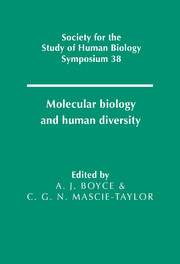Book contents
- Frontmatter
- Contents
- List of contributors
- Preface
- 1 Mitochondrial DNA in ancient and modern humans
- 2 Digital DNA typing of human paternal lineages
- 3 Minisatellites as tools for population genetic analysis
- 4 DNA fingerprinting: development of a technology and its application to the study of human populations
- 5 Kinship, inbreeding, and matching probabilities
- 6 Using the coalescent to interpret gene trees
- 7 Some attempts at measuring natural selection by malaria
- 8 AIDA: Geographical patterns of DNA diversity investigated by autocorrelation statistics
- 9 Mitochondrial DNA sequences in Europe: an insight into population history
- 10 Palaeolithic and neolithic contributions to the European mitochondrial gene pool
- 11 The molecular diversity of the Niokholo Mandenkalu from Eastern Senegal: an insight into West Africa genetic history
- 12 The peopling of Madagascar
- 13 Molecular perspectives on the colonisation of the Pacific
- 14 Population ancestry on Tristan da Cunha–the evidence of the individual
- 15 Linguistic divergence and genetic evolution: a molecular perspective from the New World
- 16 Allelic sequence diversity at the human β-globin locus
- 17 A nuclear perspective on human evolution
- 18 Contrasting gene trees and population trees of the evolution of modern humans
- 19 Methods and models for understanding human diversity
- Index
7 - Some attempts at measuring natural selection by malaria
Published online by Cambridge University Press: 19 September 2009
- Frontmatter
- Contents
- List of contributors
- Preface
- 1 Mitochondrial DNA in ancient and modern humans
- 2 Digital DNA typing of human paternal lineages
- 3 Minisatellites as tools for population genetic analysis
- 4 DNA fingerprinting: development of a technology and its application to the study of human populations
- 5 Kinship, inbreeding, and matching probabilities
- 6 Using the coalescent to interpret gene trees
- 7 Some attempts at measuring natural selection by malaria
- 8 AIDA: Geographical patterns of DNA diversity investigated by autocorrelation statistics
- 9 Mitochondrial DNA sequences in Europe: an insight into population history
- 10 Palaeolithic and neolithic contributions to the European mitochondrial gene pool
- 11 The molecular diversity of the Niokholo Mandenkalu from Eastern Senegal: an insight into West Africa genetic history
- 12 The peopling of Madagascar
- 13 Molecular perspectives on the colonisation of the Pacific
- 14 Population ancestry on Tristan da Cunha–the evidence of the individual
- 15 Linguistic divergence and genetic evolution: a molecular perspective from the New World
- 16 Allelic sequence diversity at the human β-globin locus
- 17 A nuclear perspective on human evolution
- 18 Contrasting gene trees and population trees of the evolution of modern humans
- 19 Methods and models for understanding human diversity
- Index
Summary
Introduction
The longevity of the neutralist–selectionist controversy in population genetics reflects the difficulty of measuring the extent of natural selection in both field and laboratory studies. The advent of powerful molecular tools for genetic analysis has advanced but not resolved this issue. Although there is extensive indirect evidence suggesting a major role for selection in molecular evolution, direct measures of these selection pressures are difficult. Indeed, most selective advantages are probably too small to be measurable in practical terms. However, much may be learned about the likely nature of very weak selection pressures, and of their effects, by analysing less typical large selection pressures that are within range of current studies.
Our extensive and ever-increasing knowledge of human molecular genetic diversity makes ours a species particularly amenable to observational studies of natural selection. This knowledge combined with epidemiological and clinical surveillance offers an alternative approach to studies of experimental animals with more convenient generation times and manipulable environments. Thus, the classical example of heterozygote advantage operating in natural populations remains the resistance of human heterozygotes for haemoglobin S to severe Plasmodium falciparum malaria (Allison, 1964). Other major infectious diseases of humans have been less studied, with the exception of investigations of the major histocompatibility complex where associations have been documented for diseases caused by several major pathogens (Todd, West & McDonald, 1990; Hill et al., 1991; Brahmajothi et al., 1991; Thursz et al., 1995).
- Type
- Chapter
- Information
- Molecular Biology and Human Diversity , pp. 81 - 92Publisher: Cambridge University PressPrint publication year: 1996

